Anja and Acadia von Ravenfeld @ 6 months old
out of
Raven dei Precision x Vandal vom Mittelwest
and German Shepherd Dogs
There are a lot of misconceptions about protection sports and training for dogs. I am going to talk about a couple of the ones I hear most, which are “Protection training is abusive” and “Protection dogs are aggressive”. For sake of this article, I am speaking about those who responsibly train dogs with the correct temperament for protection training, which I feel is the majority. I’ve worked with many dogs and people in protection training and have a broad understanding of this type of training. There are people in every aspect of life that can do things wrong and give an entire cause a bad rep. I’m not talking about those few.
Myth: protection training is forceful and abusive. NO! Not at all. Properly training a dog to bite requires absolutely no force whatsoever. We don’t force our dogs or intimidate them to get them to bite. We encourage, motivate, and utilize their innate drives to teach them to bite. Keep in mind, most dogs that are trained for protection sports, are usually bred for it and actually require very little to activate their prey instincts to encourage a bite. We may frustrate them to encourage a bark or bite, but no more frustration than Sparky the terrier gets when watching rabbits play in the front yard all day through the living room window. By no means is this abusive. They love the training, like a Lab loves to retrieve; a dog bred for protection work loves to bite. 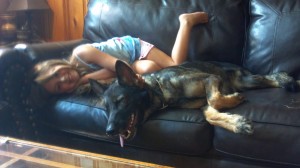
But… what about the stick they hit the dog with?? The stick in schutzhund is padded, and does not at all hurt the dog. Not a bit. The stick hits are not done with any force either. The stick hits are to test a dog’s response to a (perceived) threat or pressure, not to hurt the dog.
Myth: schutzhund/protection trained dogs are mean and aggressive towards all people. Again, nope. I’ve never met a protection trained dog that was dangerous to have in public settings. First, no dog should ever be trained in protection that has a questionable temperament. Bad temperament is genetic, and is what makes a dog mean and aggressive. Protection training does not make a dog mean and aggressive. Second, protection trained dogs are trained very highly in obedience as well as protection. I trust them more than Joe Schmoe at the park with his off leash Chihuahuas running up to me barking as he shouts “They’re friendly”. I can take my schutzhund dogs anywhere without 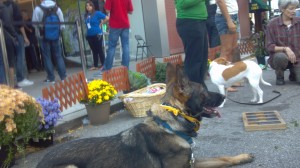 worrying at all, around any person, young, old, big, small, black, white, with a hat, without a hat.
worrying at all, around any person, young, old, big, small, black, white, with a hat, without a hat.
If I still haven’t convinced you, then get to your local reputable schutzhund or dog sport club and see them working. Seeing is believing, right?
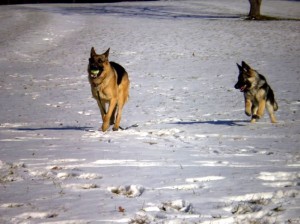
It’s that time of year already! While many dogs love the cold weather and playing in the snow, there are a few things to prepare and lookout for that come along with the snow and cold temperatures.
1. Wintertime can be hard on your dog’s paws. They are susceptible to drying, cracking, frostbite, and chemical burns (salt). There are many protective balms available to help avoid these issues. Musher’s Secret (http://musherssecret.net/) is my favorite; you can apply it directly on your dog’s paws to help protect them.
Boots are another good protective option for your dog’s paws. Keep in mind they might dislike them at first, but *usually* they get used to them and don’t mind wearing them around. I personally find the balm easier to use, but some people swear by their dog’s booties!
Keep the hair on the underside of your dog’s paw trimmed in the winter, to prevent ice balls from forming around the pads. Some dogs don’t grow excess hair underneath their paws, so you don’t have to worry about it.
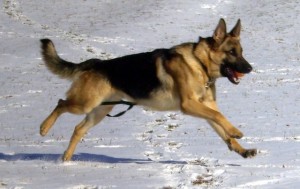 Buy a pet friendly ice melt for use on your sidewalks and driveway at home! Many de-icers are toxic. If you can avoid walking on roads and sidewalks treated with salt, do so. If not, make sure you always wipe off your dog’s paws with warm water after a walk. Discourage your dog from eating snow near roads and sidewalks that have been treated with salt.
Buy a pet friendly ice melt for use on your sidewalks and driveway at home! Many de-icers are toxic. If you can avoid walking on roads and sidewalks treated with salt, do so. If not, make sure you always wipe off your dog’s paws with warm water after a walk. Discourage your dog from eating snow near roads and sidewalks that have been treated with salt.
If you notice your dog holding their paws up off the ground abnormally at any time while on a walk or playing in the snow, time to call it and head back inside!
2. Anti-freeze is very toxic and there is a high mortality rate when ingested. The sweet smell attracts dogs. If you use anti-freeze, lock it away in a vault after use. There are alternatives to anti-freeze also (propylene glycol). If you suspect in the slightest your dog could have ingested anti-freeze, get to the vet immediately!
3. Arthritis tends to be worse in cold weather. If you notice your dog become stiff, or taking longer to get up and down, you might want to have an x-ray done to determine if it is due to arthritis. There are many things you can do to help ease the pain from arthritis in your dog. Moderate exercise, weight control, supplements, acupuncture are just a few.
4. Be careful not to let your d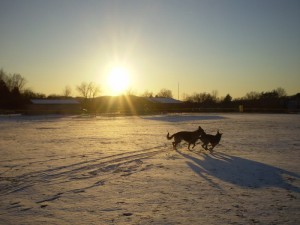 og run on any icy spots. They can twist or sprain a muscle, or break a bone if they run and slip on ice the wrong way! If it is an icy day, be very careful!! Dogs also don’t realize what thin ice is. Be careful around frozen lakes, or ponds! Training your dog to walk on a loose leash is important all year round, but especially in the wintertime when you don’t want your dog pulling you around on the snow and ice.
og run on any icy spots. They can twist or sprain a muscle, or break a bone if they run and slip on ice the wrong way! If it is an icy day, be very careful!! Dogs also don’t realize what thin ice is. Be careful around frozen lakes, or ponds! Training your dog to walk on a loose leash is important all year round, but especially in the wintertime when you don’t want your dog pulling you around on the snow and ice.
5. For small dogs, or dogs with a short, tight or single layer coat, be careful having them outside for too long of a period at a time. Sweaters can be very important for some breeds of dogs. If your dog is shivering, time to head back inside! If your dog is small, and the snow accumulation is taller than them, you will have to shovel out a pathway or potty and play area for them outside.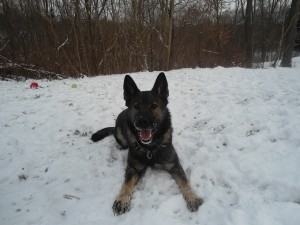
6. Fireplaces and space heaters can be attractive to some dogs, make sure that they don’t lie too close to these and get burned! All fireplaces should have a grate or a door of some sort. Be careful your dog doesn’t knock over a space heater, which could be a fire hazard for the entire household. Never leave a space heater on with a dog around unsupervised!
Keep these things in mind when you head outside with Fido to play a game of snowball fetch!